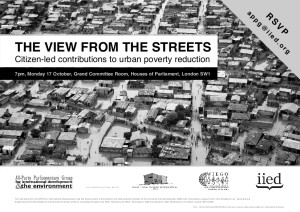Citizen-led contributions to urban poverty reduction
 On Monday 17 October 2011, the All-Party Parliamentary Groups (APPGs) for International Development and the Environment forum held a meeting titled ‘The view from the streets: Citizen-led contributions to urban poverty reduction’. Amongst the line-up of speakers at the meeting, will be our very own Project Leader, Richard Dobson representing Women in the Informal Economy: Globalising and Organising (WIEGO) and Asiye eTafuleni; including Bijal Bhatt from the Mahila Housing SEWA (Self-Employed Women’s Association of India) Trust, Diana Mitlin from the International Institute for Environment & Development and Jockin Arphutham from Shack/Slum Dwellers International.
On Monday 17 October 2011, the All-Party Parliamentary Groups (APPGs) for International Development and the Environment forum held a meeting titled ‘The view from the streets: Citizen-led contributions to urban poverty reduction’. Amongst the line-up of speakers at the meeting, will be our very own Project Leader, Richard Dobson representing Women in the Informal Economy: Globalising and Organising (WIEGO) and Asiye eTafuleni; including Bijal Bhatt from the Mahila Housing SEWA (Self-Employed Women’s Association of India) Trust, Diana Mitlin from the International Institute for Environment & Development and Jockin Arphutham from Shack/Slum Dwellers International.
The APPGs are officially-recognised but have no formal role in the UK parliamentary process. However, the APPG for International Development and the Environment is a forum whereby parliamentarians can discuss the links between environment and poverty, and engage with people and organisations outside Parliament. The secretariat for the APPG is provided by the International Institute for Environment and Development (IIED) and is supported by the Development & Environment Group of BOND, the UK membership body for international development organisations.
Attending the event were members of parliament from all political parties, members of the UK second chamber the House of Lords, parliamentary staff, civil servants, representatives of NGOs and civil society organisations, academics etc. Attendees will be a mix of specialists and non-specialists. The meeting took place in the Grand Committee Room within the Houses of Parliament in Westminster. This is one of the largest and, as its name suggests, most prestigious meeting rooms in the Palace of Westminster.
Reflecting on Asiye eTafuleni’s experience, Richard Dobson’s presentation at this large assembly, regarding citizen-led contributions to urban poverty reduction included the following points:
- Community structures provide the conduit for development and enhances organizational legibility. This in turn provides a visible incentive that encourages external support.
- Community organizing is initiated and maintained by extraordinary levels of volunteerism.
- The negative circumstances arising from deprivation often produce project clarity and focus, with inspired creativity.
- Built environment professionals have been practicing ‘value management’ for approximately 20 years. The theory is that maximum value is only obtained by incremental analysis throughout the entire delivery process – not just the end product. An engaged and thoroughly participative community process demonstrates this theory in practice.
- Often the pragmatic logic of the urban poor challenges the preconceived and prejudices vision of an imagined urban future espoused by urban development practitioners.
For access to the full power-point presentation of [download id=”21″]

